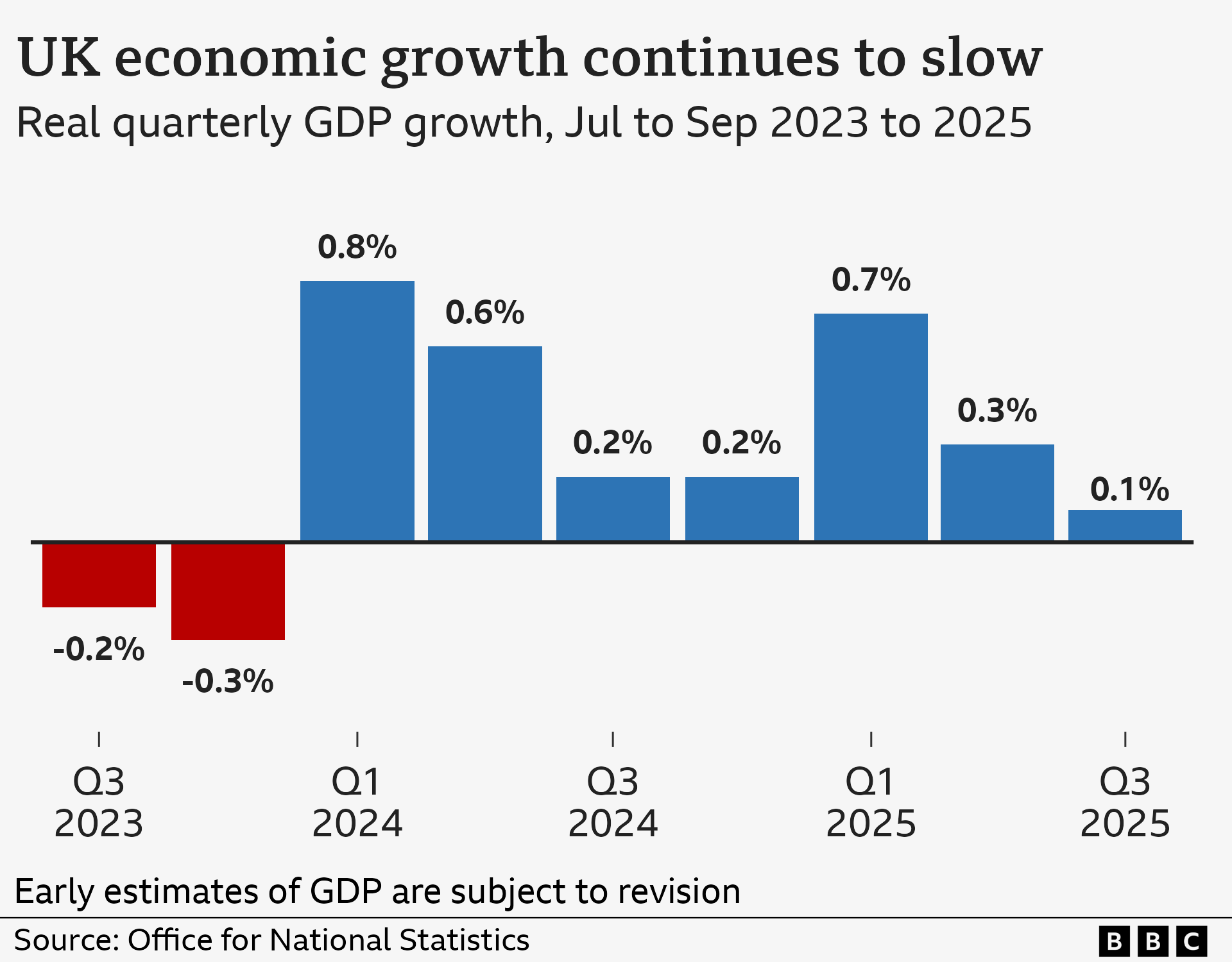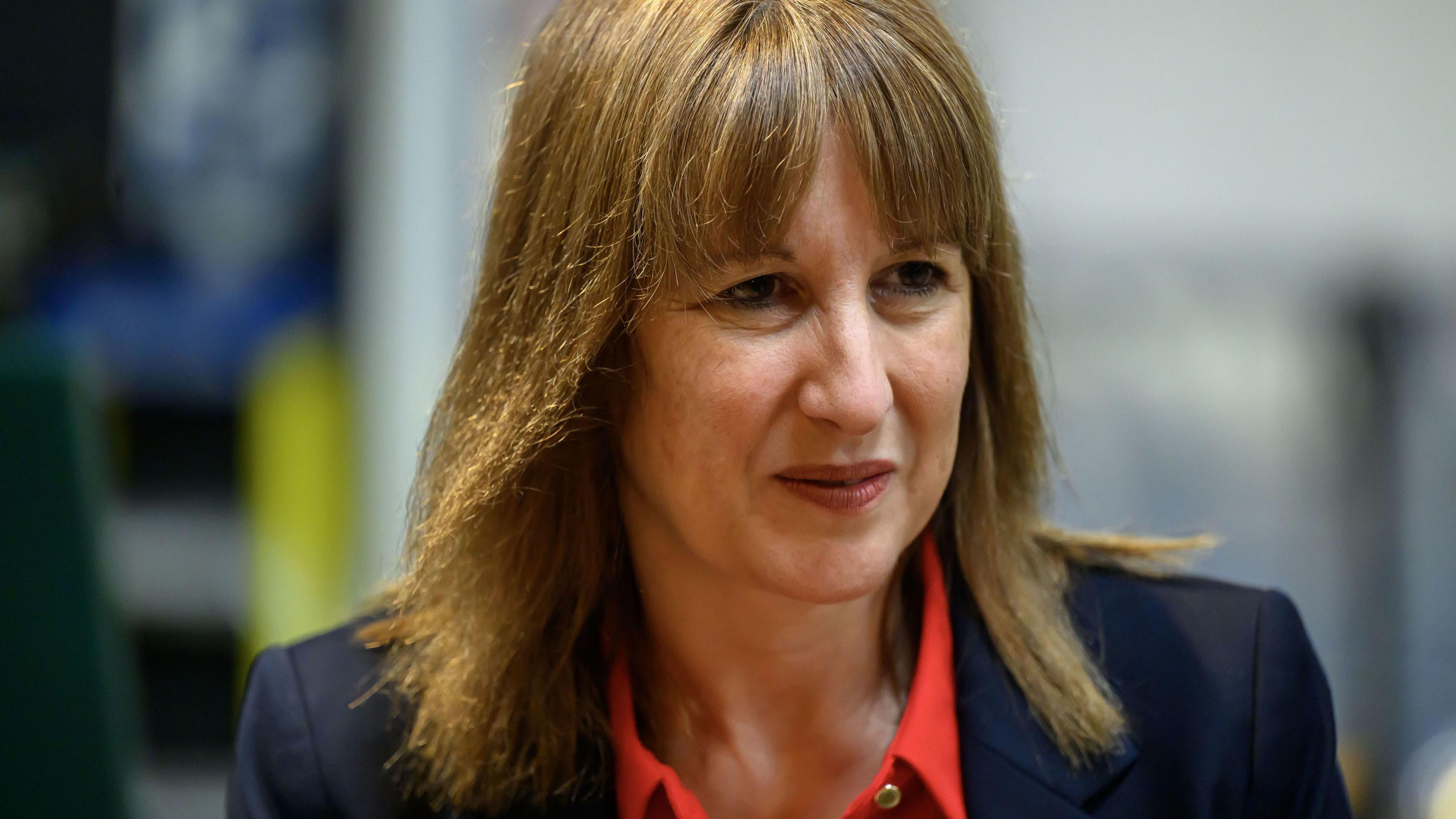What is GDP and how fast is the UK's economy growing?

- Published
The UK economy has been slowing after a strong start to 2025.
The latest figures show that the economy grew by 0.1% in the July-to-September period but shrank by 0.1% in September itself.
The rate of economic growth matters because it affects things like pay increases for workers and the amount of tax the government can raise to pay for services.
What is GDP and how is it worked out?
GDP stands for gross domestic product, and is a measure of all the economic activity of companies, governments, and people in a country.
In the UK, the ONS publishes new GDP figures every month, external. However, the quarterly figures - covering three months at a time - are considered more important.
Most economists, politicians, and businesses like to see GDP rising steadily.
That's because it usually means people are spending more, extra jobs are created, more tax is paid, and workers get better pay rises.
When GDP is falling, it means the economy is shrinking - which can be bad news for businesses and workers.
If GDP falls for two quarters in a row, that is known as a recession, which can lead to pay freezes and job losses.
What is happening to the UK economy?
Many economists and politicians are concerned that the UK economy is not growing fast enough.
When the Labour government took power in July 2024, it made growth its top priority.
Although the economy grew more than expected at the start of 2025, analysts had warned that the disruption and uncertainty caused by the US trade tariffs, which began in April, could limit growth in the later part of the year.
The growth of 0.3% recorded in the three months to the end of June actually painted a more positive picture than experts had predicted.
This then dropped back to 0.1% for the third quarter covering July to September. Analysts had expected growth of 0.2%.

In October, the International Monetary Fund (IMF) predicted that the UK would be the second-fastest-growing major economy in 2025.
It forecast the GDP would grow by 1.3% across the year as a whole, and would expand at the same rate in 2026.
The projection for 2025 is higher than the 1% forecast made in March by the Office for Budget Responsibility (OBR) - which monitors the government's spending plans and performance.

Chancellor Rachel Reeves welcomed the IMF's upgraded forecast, but said that "for too many people, our economy feels stuck"
The July to September GDP figures are the last before the Budget on 26 November, when Chancellor Rachel Reeves is widely expected to raise taxes in order to meet her self-imposed rules which limit government borrowing.
How does GDP affect me?
If GDP is going up steadily, people pay more in tax because they're earning and spending more.
This means more money for the government, which it can choose to spend on public services, such as schools, police and hospitals.
When the economy shrinks and a country goes into recession, these things can go into reverse.
Governments tend to get less money in tax, which means they may decide to freeze or cut public spending, or put taxes up.
In 2020, the Covid pandemic caused the most severe UK recession for more than 300 years, which forced the government to borrow hundreds of billions of pounds to support the economy.
How is GDP measured?
GDP can be measured in three ways:
Output: The total value of the goods and services produced by all sectors of the economy - agriculture, manufacturing, energy, construction, the service sector and government
Expenditure: The value of goods and services bought by households and by government, investment in machinery and buildings - this also includes the value of exports, minus imports
Income: The value of the income generated, mostly in terms of profits and wages

In the UK, the ONS publishes one single measure of GDP, which is calculated using all three measurements.
But early estimates mainly use the output measure, using data collected from thousands of companies.
Why does the GDP figure sometimes change?
The UK produces one of the quickest estimates of GDP of the major economies, about 40 days after the quarter in question.
At that stage, only about 60% of the data is available, so the figure is revised as more information comes in.
The ONS publishes more information about this on its website, external.
What are the limitations of the GDP figure?
GDP doesn't tell the whole story:
The hidden economy: unpaid work such as caring for children or elderly relatives isn't captured
Inequality: rising GDP could result from the richest getting richer, rather than everyone becoming better off, and some people could be worse off
Living standards: if the population is also growing, increased GDP can still mean less money per person, which can reduce people's living standards. This is why the GDP per capita measure is important

Official GDP figures don't take into account unpaid work like looking after children
Some critics also argue that GDP doesn't take into account whether the economic growth it measures is sustainable, or the environmental damage it might do.
Alternative measures have been developed which try to capture this.
Since 2010, the ONS has also measured well-being, external alongside economic growth. This assesses health, relationships, education and skills, as well as people's personal finances and the environment.
But despite its limitations, GDP is still the most widely used measure for most government decisions and international comparisons.